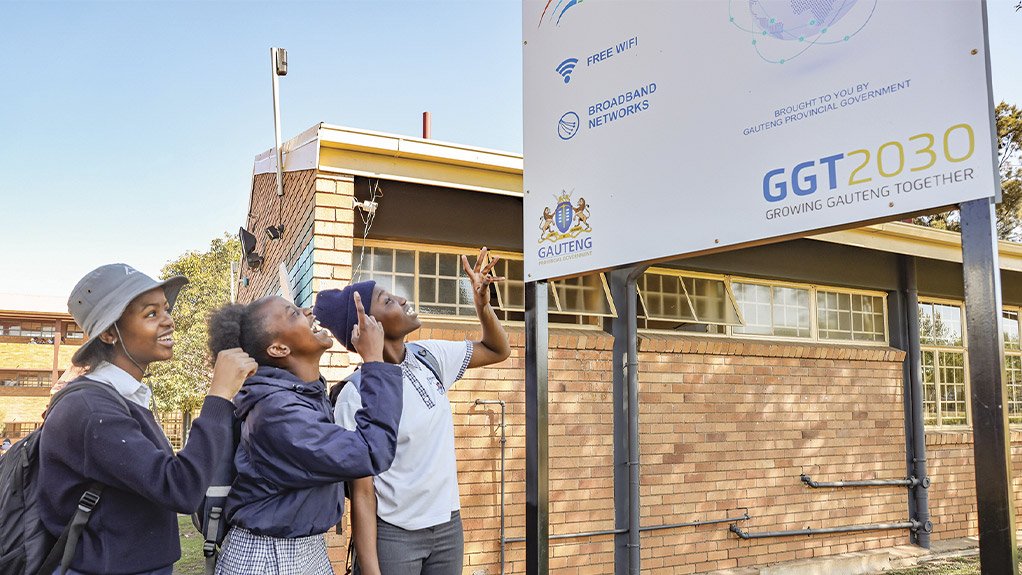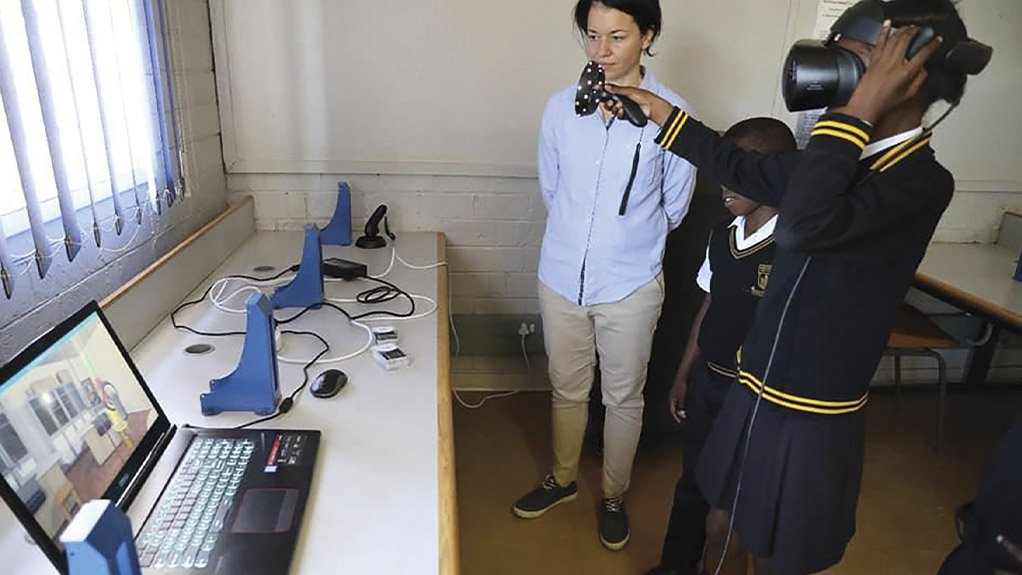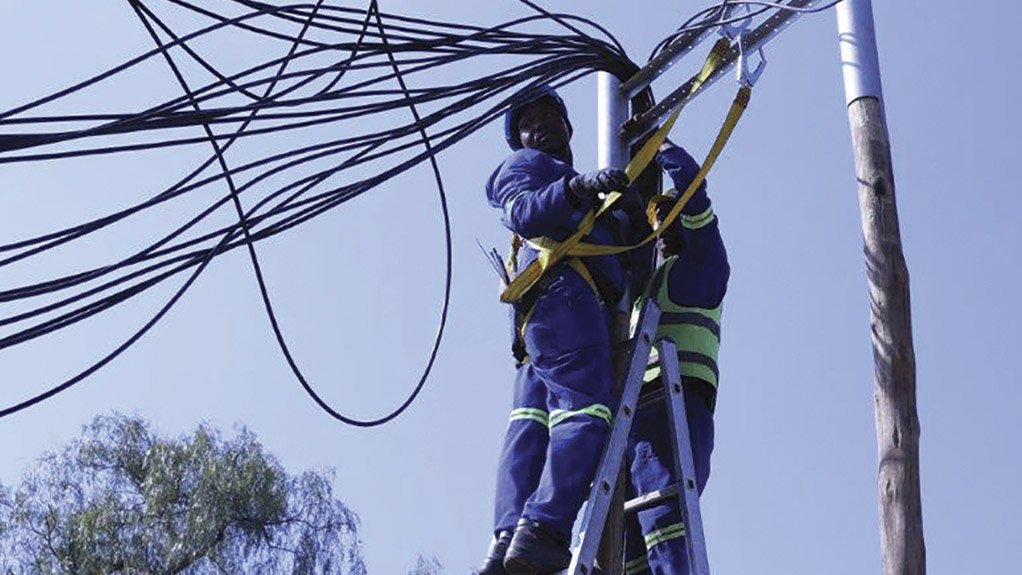Gauteng Wi-Fi caters for disadvantaged areas in the province





The Gauteng Provincial Network (GPN) will assist in improving systems downtimes to ensure residents access services faster.
The network allows Gauteng Provincial Government employees to work remotely and enjoy group work as they can connect to the network anywhere in their workplace.
The GPN network is utilized for e-Learning in schools making learning fun and exciting.
Installation of overhead fibre cabling taking place at Sterkfontein Hospital. The hospital is on the GPN network including all hospitals, schools and other government institutions in Gauteng.
The Gauteng Provincial Network (GPN), the province’s Wi-Fi programme, will connect all previously disadvantage areas to ensure that everyone in the province is connected. Phase three of the programme will also connect hostels in Gauteng. GPN is the new name of the province’s Wi-Fi system, which used to be called the Gauteng Broadband Network (GBN).
The network provides fast and sustainable connectivity, which has improved the deployment and functioning of service delivery systems in the province. Back-end systems that are utilized by departments include the school registration system, applications on the Gauteng Digital Platform and many other systems utilized for servicing the public, which have turned the corner in terms of efficiency because of the GPN network.
As part of the mandate of the department to modernize public services in Gauteng and the delivery of reliable high-tech systems in line with the Fourth Industrial Revolution (4IR) Strategy of the Province, the Gauteng Department of e-Government (e-Gov) has extended connectivity to hostels, with townships and informal settlements to follow soon. This is informed by the increase in internet penetration and utilization of mobile devices.
Datareportal, who issued the Digital 2023 report on South African internet penetration, mentioned that there were 43.48-million internet users in South Africa at the start of 2023 and internet penetration stood at 72.3%. South Africa was home to 25.80-million social media users in January 2023, equating to 42.9% of the population. Furthermore, 112.7 million cellular mobile connections were active in South Africa in early 2023, with this figure equivalent to 187.4% of the total population.
Mr Mzi Khumalo, MEC for Cooperative Governance and Traditional Affairs and e-Gov said the increase in internet connectivity has enabled the provincial government to provide internet-based services to the residents of Gauteng that can be accessed through any device, especially mobile devices.
So far, the department has connected 6 hostels in Johannesburg with high-speed Wi-Fi: George Goch Hostel, Jeppe Hostel, Denver Hostel, MBA Hostel, Murray and Roberts Hostel, and Rethabile LTE Hostel.
Khumalo has urged the hostel residents to use the GPN for everyday needs including job applications and research for academic assignments.
“The reason we decided to install Wi-Fi in hostels is that we want to help our people who cannot afford data to access the internet easily or without having to go to internet cafes. We provide our services online, and as a result, people need to have data to access them, so it is important that we give them a network that will help them to access our services. We encourage residents to use GBN properly, for example scholars must use it for learning purposes and those that are unemployed must use it to apply for jobs,” said Khumalo.
Khumalo further stated that it was critical for the department to create its own network so that local people can use GPN to access e-services.
“When e-Gov was established, the focus was to develop our own connectivity infrastructure, so we stopped relying on telecoms service providers who were charging us an arm and a leg for connectivity. We know that this will result in a lot of cost savings and those funds will be directed elsewhere. I am happy to report that we have really achieved a great deal in this regard and people will connect on our network for free.”
Gauteng Provincial Network coverage
The GPN Wi-Fi connectivity provided by the Gauteng Provincial Government (GPG) is supplied to schools, clinics, hospitals, libraries, parks, community centers et cetera. as part of digitizing Gauteng. The GPN is a step towards bridging the digital divide while providing greater accessibility to government services and free Wi-Fi to residents in Townships, Informal Settlements and Hostels.
With the GPN, to date, 1 225 Wide Area Network (WAN) sites have been provided with connectivity at 100 megabytes per second. In the 2023/24 financial year, the department will further provide WAN connectivity to 3 000 sites across five regions in the province. Furthermore, to ensure end-to-end connectivity, it has targeted the provision of Local Area Networks (LAN) to 2 557 sites and 670 LAN sites. The network will also assist job seekers in applying for jobs. Learners and students can use it for their schoolwork such as conducting research and assignments.
The Head of Department for e-Government, Research and Development, Mr Cyril Baloyi indicates that given the role that information and communication technology (ICT) plays as an enabler of development in our communities, e-Gov continues to focus on the delivery of free internet connectivity for Gauteng residents in order to accelerate the creation of a digital society.
Baloyi adds that e-Gov was established in 2015 with the mandate to digitize and modernize services provided by the GPG. A core function of the department entails transforming government services, such that they are accessed digitally, known as ‘e-services’. Citizens are able to access over 50 government services through the ‘Gauteng Digital Platform’ www.gauteng.gov.za using their mobile phones or computers.
“The provision of these e-services had to be accompanied by the delivery of Wi-Fi Connectivity in the most parts of Gauteng. The rollout out of GPG’s Wi-Fi connectivity commenced in 2014 as Phase 1 of the Network. Phase 2 of the project was rolled out from 2019 to March 2023, with both these phases successfully completing the installation of the needed infrastructure that introduces speed, reliability and broad coverage. Furthermore, during these phases, more than 1 400 places were connected to the network such as schools, hospitals, clinics, libraries, community centers, parks, government buildings and many other sites, Baloyi said.”
e-Gov has dedicated most of its resources to ensuring that lives continue to be changed through the provision of the network, with a new focus to expand its footprint, covering more areas in townships, informal settlements and hostels. This is done to further accelerate development in economically and socially disadvantaged communities in Gauteng.
“We cannot talk about economic and social development without including the need for digitization in the 4IR era. The development and growth of communities, requires that people have the ability and means to access online interventions and digital solutions. Therefore, the provision of technology in townships, informal settlements and hostels contributes towards the needed solutions to improve people’s lives,” Baloyi said.
Article Enquiry
Email Article
Save Article
Feedback
To advertise email advertising@creamermedia.co.za or click here
Announcements
What's On
Subscribe to improve your user experience...
Option 1 (equivalent of R125 a month):
Receive a weekly copy of Creamer Media's Engineering News & Mining Weekly magazine
(print copy for those in South Africa and e-magazine for those outside of South Africa)
Receive daily email newsletters
Access to full search results
Access archive of magazine back copies
Access to Projects in Progress
Access to ONE Research Report of your choice in PDF format
Option 2 (equivalent of R375 a month):
All benefits from Option 1
PLUS
Access to Creamer Media's Research Channel Africa for ALL Research Reports, in PDF format, on various industrial and mining sectors
including Electricity; Water; Energy Transition; Hydrogen; Roads, Rail and Ports; Coal; Gold; Platinum; Battery Metals; etc.
Already a subscriber?
Forgotten your password?
Receive weekly copy of Creamer Media's Engineering News & Mining Weekly magazine (print copy for those in South Africa and e-magazine for those outside of South Africa)
➕
Recieve daily email newsletters
➕
Access to full search results
➕
Access archive of magazine back copies
➕
Access to Projects in Progress
➕
Access to ONE Research Report of your choice in PDF format
RESEARCH CHANNEL AFRICA
R4500 (equivalent of R375 a month)
SUBSCRIBEAll benefits from Option 1
➕
Access to Creamer Media's Research Channel Africa for ALL Research Reports on various industrial and mining sectors, in PDF format, including on:
Electricity
➕
Water
➕
Energy Transition
➕
Hydrogen
➕
Roads, Rail and Ports
➕
Coal
➕
Gold
➕
Platinum
➕
Battery Metals
➕
etc.
Receive all benefits from Option 1 or Option 2 delivered to numerous people at your company
➕
Multiple User names and Passwords for simultaneous log-ins
➕
Intranet integration access to all in your organisation





















